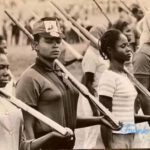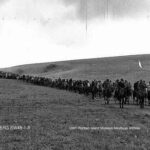by Carolin Felden. Main Article in German language.
Between 1967 and 1970, Nigeria was engulfed in a devastating war between the Nigerian government and the secessionist Republic of Biafra. The war concluded nearly three years later with Nigeria’s victory, yet it left in its wake a staggering toll of over two million lives lost. Notably, the role of women in the Biafran struggle was multifaceted; they emerged as warriors, scholars, farmers, and providers, playing a crucial role in sustaining the republic during its tumultuous existence. While commonly referred to as the “Nigerian Civil War,” this article contends that such terminology inadequately captures the war’s broader context. The legacy of British colonialism in Nigeria (1914-1961) is posited as a significant factor contributing to the war’s outbreak (cf. Richardson 2019: 79). Consequently, this article seeks to elucidate that the Biafran quest for independence was not merely a confrontation with the Nigerian government but rather a profound struggle against neocolonial foreign domination. Special emphasis will be placed on the indispensable contributions of Biafran women to this cause.
Category: Silences in African History
Silences around the Memory of the Mpondoland Revolts in South Africa (1950s-1961)
by Jana Roth
“…This revolutionary movement called Congo Movement or iKongo opposed the white nationalist government by incorporating approaches of witchcraft and sorcery to create a separate nation and fight against the apartheid state. The fact that very little published work without a systematic study of the Mpondo resistance exists, is an example of resistance by the marginalized that remains widely hidden. In this context, urban anti-apartheid struggles like the Sharpeville and Langa protests are well remembered, yet rural resistances like the Mpondoland revolts remain largely absent in historical narratives (Kepe & Ntsebeza 2011: 3ff.). This points to different aspects of silence revolving around the memory of these revolts, especially in contemporary discourses. In the case of iKongo, it is relevant to study the silences around womxn and around witchcrafts, since both remain subjects of silence and prejudice throughout history…”

